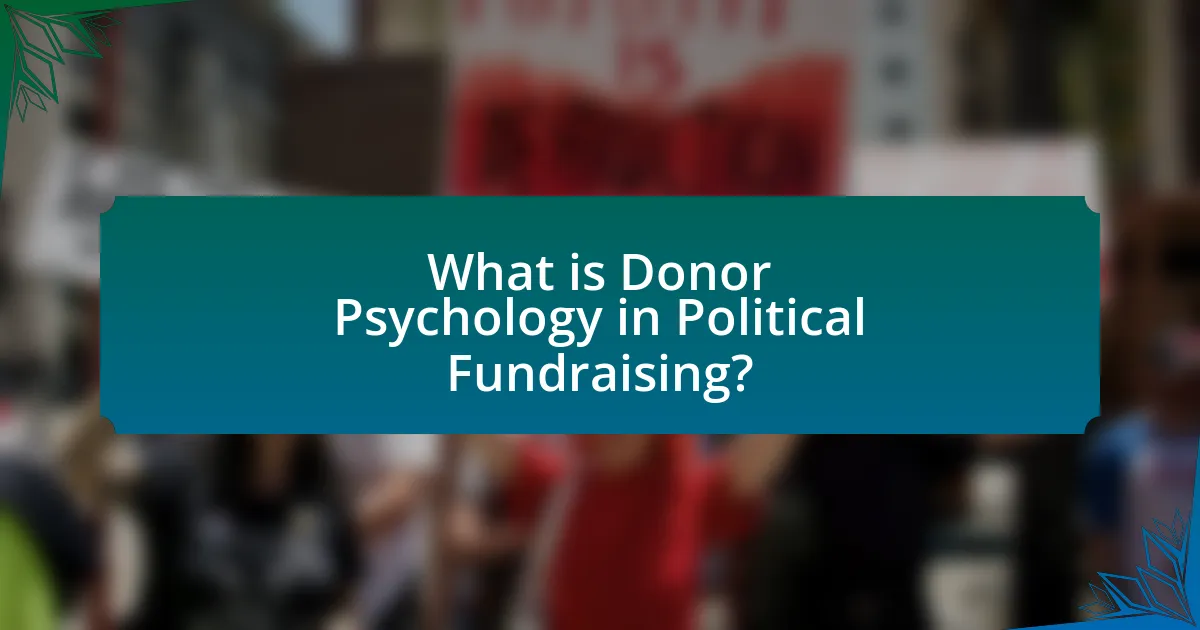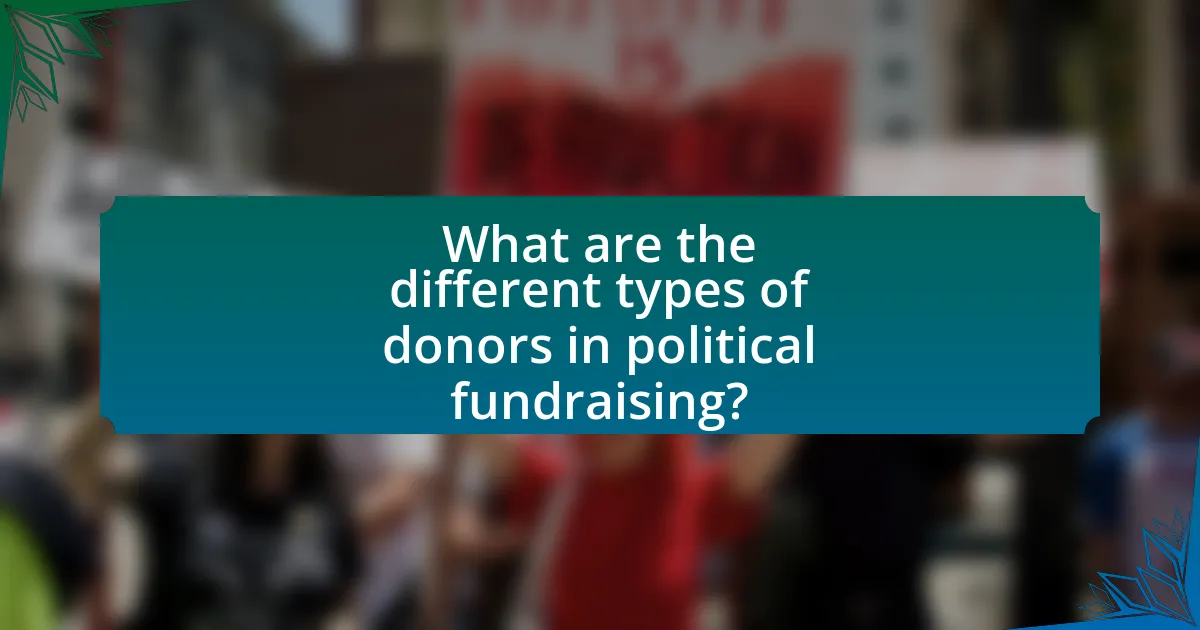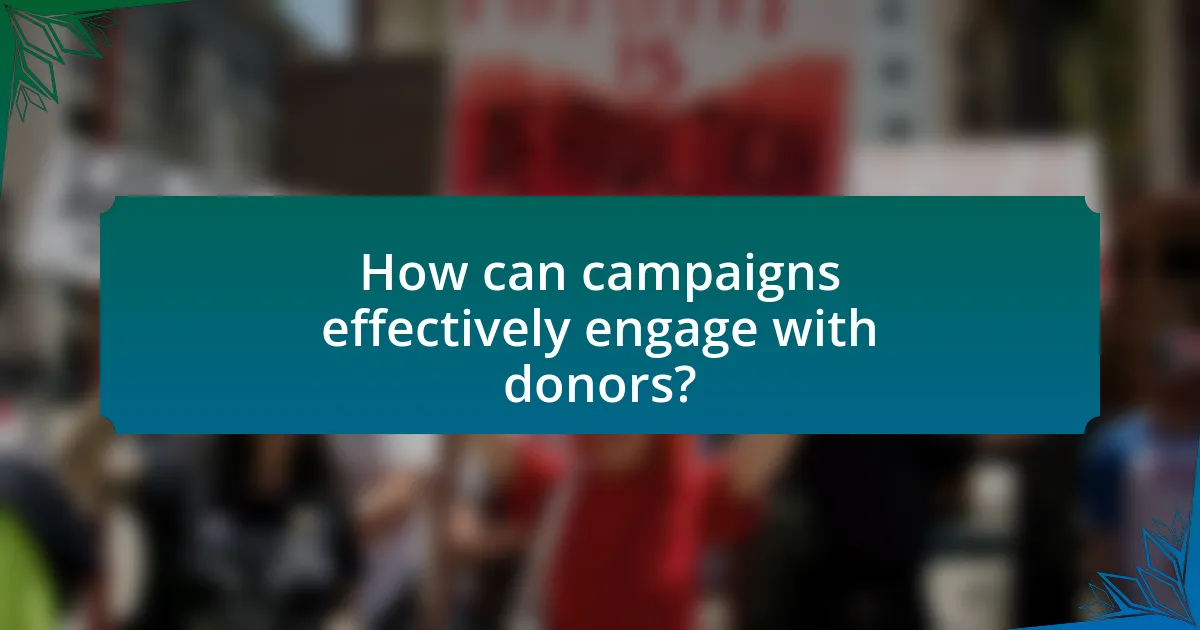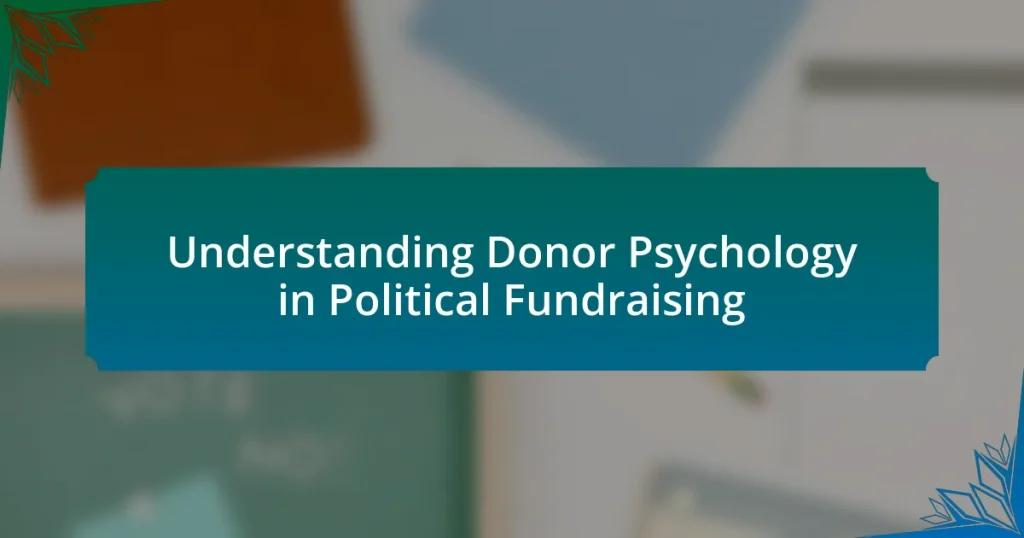Donor psychology in political fundraising examines the motivations, behaviors, and emotional triggers that drive individuals to financially support political campaigns. Key factors influencing donor decisions include personal values, social identity, emotional connections, and the perceived impact of donations. Understanding these psychological elements allows political campaigns to tailor their strategies effectively, enhancing engagement and increasing contributions. The article explores various aspects of donor psychology, including the differences between individual and institutional donors, the importance of emotional appeals, and best practices for building long-term donor relationships. Additionally, it highlights the significance of data analytics in understanding donor behavior and optimizing fundraising efforts.

What is Donor Psychology in Political Fundraising?
Donor psychology in political fundraising refers to the study of the motivations, behaviors, and emotional triggers that influence individuals to contribute financially to political campaigns or causes. This field examines factors such as personal values, social identity, and perceived impact of donations, which can significantly affect a donor’s decision-making process. Research indicates that emotional appeals, social proof, and a sense of belonging can enhance donor engagement and increase contributions, as evidenced by studies showing that campaigns that effectively communicate their mission and connect with potential donors on an emotional level tend to raise more funds.
How does donor psychology influence political fundraising strategies?
Donor psychology significantly influences political fundraising strategies by shaping how campaigns engage potential contributors. Understanding the motivations, emotions, and cognitive biases of donors allows political organizations to tailor their messaging and outreach efforts effectively. For instance, research indicates that donors are often driven by a sense of social identity and belonging, which can be leveraged through community-focused campaigns that emphasize collective goals. Additionally, the principle of reciprocity plays a crucial role; when campaigns provide value, such as exclusive content or recognition, donors are more likely to contribute. Studies show that personalized communication, which resonates with individual donor values and interests, can increase donation rates by up to 30%. Thus, by aligning fundraising strategies with the psychological drivers of donors, political campaigns can enhance their fundraising effectiveness.
What are the key psychological factors that motivate donors?
The key psychological factors that motivate donors include altruism, social influence, personal identity, and emotional connection. Altruism drives individuals to contribute to causes they believe in, often stemming from a desire to help others or make a positive impact. Social influence plays a significant role, as individuals are often motivated by the actions and opinions of their peers, leading to a sense of belonging and community. Personal identity is another factor, where donors align their contributions with their values and beliefs, reinforcing their self-image. Emotional connection, particularly through storytelling and relatable narratives, can evoke empathy and inspire action, making donors feel personally invested in the cause. Research indicates that these factors are critical in understanding donor behavior, as they shape the motivations behind financial contributions in political fundraising contexts.
How do emotions play a role in donor decision-making?
Emotions significantly influence donor decision-making by shaping perceptions of causes and organizations. Research indicates that emotional appeals, such as stories of personal impact or urgency, can enhance the likelihood of donations. For instance, a study published in the Journal of Marketing Research found that emotional narratives increased donations by 50% compared to factual appeals alone. This demonstrates that emotions not only drive initial interest but also foster a deeper connection to the cause, ultimately guiding the decision to contribute financially.
Why is understanding donor psychology crucial for political campaigns?
Understanding donor psychology is crucial for political campaigns because it enables candidates to tailor their messaging and fundraising strategies effectively. By comprehending the motivations, values, and emotional triggers of potential donors, campaigns can create targeted appeals that resonate deeply, increasing the likelihood of contributions. Research indicates that donors are influenced by factors such as personal connections to candidates, perceived social norms, and the urgency of the campaign, which underscores the importance of aligning campaign strategies with these psychological drivers. For instance, a study by the Harvard Kennedy School found that personalized communication significantly boosts donor engagement and contributions, demonstrating that understanding donor psychology directly impacts fundraising success.
What impact does donor psychology have on fundraising success?
Donor psychology significantly impacts fundraising success by influencing how and why individuals choose to contribute. Understanding the motivations, emotions, and cognitive biases of donors can lead to more effective fundraising strategies. For instance, research indicates that donors are often driven by a sense of social identity and belonging, which can be leveraged through targeted messaging and community engagement. A study published in the Journal of Economic Psychology found that emotional appeals can increase donation amounts by up to 50%, demonstrating the power of psychological factors in motivating contributions. Additionally, the principle of reciprocity, where donors feel compelled to give back after receiving something, can enhance fundraising outcomes when organizations provide value to potential donors.
How can campaigns tailor their messages based on donor psychology?
Campaigns can tailor their messages based on donor psychology by understanding the motivations and emotional triggers that drive donor behavior. Research indicates that donors are influenced by factors such as social proof, reciprocity, and personal connection to the cause. For instance, campaigns can highlight testimonials from other donors to create a sense of community and belonging, which leverages social proof. Additionally, emphasizing the impact of donations through storytelling can evoke emotional responses, making donors feel personally connected to the cause. A study by the Stanford Social Innovation Review found that narratives that resonate emotionally can increase donor engagement and willingness to contribute. By aligning messaging with these psychological principles, campaigns can effectively enhance their appeal and increase fundraising success.

What are the different types of donors in political fundraising?
The different types of donors in political fundraising include individual donors, corporate donors, political action committees (PACs), and major donors. Individual donors contribute personal funds, often motivated by personal beliefs or candidate support. Corporate donors represent businesses and typically contribute to align with their interests or influence policy. Political action committees (PACs) pool contributions from members to support candidates or legislation that align with their goals. Major donors, often referred to as “bundlers,” raise significant amounts of money by gathering contributions from multiple sources, thereby amplifying their influence in the political arena. These classifications are essential for understanding the dynamics of political fundraising and donor motivations.
How do individual donors differ from institutional donors?
Individual donors differ from institutional donors primarily in their motivations and decision-making processes. Individual donors often contribute based on personal beliefs, emotional connections, or social influences, while institutional donors, such as corporations or foundations, typically base their contributions on strategic goals, alignment with organizational missions, and potential return on investment. For example, a study by the Lilly Family School of Philanthropy indicates that individual donations are often driven by personal experiences or relationships with causes, whereas institutional donations are influenced by broader organizational objectives and policies. This distinction highlights the varying psychological and strategic factors that influence donor behavior in political fundraising contexts.
What motivations drive individual donors to contribute?
Individual donors are primarily motivated to contribute by a desire to support causes they believe in, a sense of social responsibility, and the influence of personal relationships. Research indicates that emotional connections to specific issues, such as healthcare or education, drive individuals to donate, as they feel a personal stake in the outcomes. Additionally, social norms and peer influence play significant roles; individuals often give because they see others doing so or because they are encouraged by friends and family. According to a study by the Indiana University Lilly Family School of Philanthropy, 70% of donors reported that they give to organizations that align with their values and beliefs, highlighting the importance of personal alignment with the cause.
How do institutional donors approach political contributions?
Institutional donors approach political contributions strategically, often aligning their financial support with candidates or parties that reflect their organizational values and policy interests. These donors typically conduct thorough research on political candidates’ positions, past voting records, and potential impact on their industry or sector. For instance, a study by the Center for Responsive Politics found that institutional donors, such as corporations and trade associations, contributed over $2.5 billion in the 2020 election cycle, demonstrating their significant influence in shaping political agendas. This approach ensures that their contributions not only support candidates but also advance specific legislative goals that benefit their interests.
What are the characteristics of high-value donors?
High-value donors typically exhibit a strong commitment to a cause, demonstrated through significant financial contributions and ongoing engagement. These donors often have a history of philanthropy, showing a pattern of giving that reflects their values and priorities. Research indicates that high-value donors are more likely to be influenced by personal connections to the cause, such as shared experiences or relationships with beneficiaries. Additionally, they tend to seek recognition for their contributions, valuing transparency and impact reporting to understand how their donations are utilized. Studies show that high-value donors often prefer to engage with organizations that align with their personal beliefs and demonstrate effective use of funds, reinforcing their loyalty and willingness to give.
How can campaigns identify and engage high-value donors?
Campaigns can identify and engage high-value donors by utilizing data analytics to assess donor behavior and preferences. By analyzing past donation patterns, demographic information, and engagement levels, campaigns can pinpoint individuals who have a history of significant contributions or show potential for high-value donations. For instance, a study by the Association of Fundraising Professionals indicates that targeted outreach to previous major donors can yield a 30% increase in repeat donations. Additionally, personalized communication strategies, such as tailored messaging and exclusive events, can enhance engagement, as high-value donors often respond positively to recognition and relationship-building efforts.
What strategies are effective in retaining high-value donors?
Effective strategies for retaining high-value donors include personalized communication, regular engagement, and demonstrating impact. Personalized communication fosters a deeper connection, as tailored messages resonate more with donors, making them feel valued. Regular engagement through updates, exclusive events, and recognition keeps donors informed and involved, reinforcing their commitment. Demonstrating impact through transparent reporting on how their contributions are utilized shows donors the tangible results of their support, which can enhance their loyalty. Research indicates that organizations that effectively communicate their impact retain donors at a higher rate, with studies showing that 70% of donors are more likely to continue giving when they receive regular updates on the outcomes of their contributions.

How can campaigns effectively engage with donors?
Campaigns can effectively engage with donors by personalizing communication and demonstrating the impact of contributions. Personalization fosters a connection, as tailored messages resonate more with donors, making them feel valued and understood. For instance, research from the Fundraising Effectiveness Project indicates that personalized appeals can increase donor retention rates by up to 40%. Additionally, showcasing the tangible outcomes of donations, such as specific projects funded or lives changed, reinforces the donor’s sense of purpose and encourages ongoing support. This approach aligns with findings from the Association of Fundraising Professionals, which highlight that donors are more likely to give again when they see the direct results of their contributions.
What communication strategies resonate with potential donors?
Effective communication strategies that resonate with potential donors include personalized messaging, storytelling, and transparency. Personalized messaging, which addresses donors by name and acknowledges their past contributions, fosters a sense of connection and appreciation. Storytelling engages potential donors emotionally by illustrating the impact of their contributions through real-life examples, making the cause relatable and compelling. Transparency about how funds will be used builds trust, as donors prefer to know the specific outcomes their contributions will support. Research indicates that organizations employing these strategies see higher engagement rates and increased donations, demonstrating their effectiveness in political fundraising contexts.
How can storytelling enhance donor engagement?
Storytelling enhances donor engagement by creating emotional connections that resonate with potential supporters. When organizations share compelling narratives about their mission, impact, and the individuals they help, they evoke empathy and inspire action. Research indicates that stories can increase donation likelihood by up to 30%, as they allow donors to visualize the difference their contributions make. For instance, a study published in the Journal of Marketing Research found that emotional appeals in storytelling significantly boost engagement and willingness to donate. This demonstrates that effective storytelling not only captures attention but also fosters a deeper commitment to the cause.
What role does transparency play in donor relationships?
Transparency is crucial in donor relationships as it fosters trust and accountability. When organizations openly share information about their financial practices, project outcomes, and decision-making processes, donors feel more secure in their contributions. Research indicates that 85% of donors are more likely to give to organizations that demonstrate transparency in their operations. This trust leads to increased donor retention and higher levels of engagement, as transparent practices encourage ongoing communication and collaboration between donors and organizations.
What are the best practices for building long-term donor relationships?
The best practices for building long-term donor relationships include consistent communication, personalized engagement, and demonstrating impact. Consistent communication ensures donors feel informed and valued, while personalized engagement fosters a deeper connection by addressing individual donor interests and motivations. Demonstrating impact through transparent reporting on how donations are utilized reinforces trust and encourages continued support. Research indicates that organizations that maintain regular contact with donors and provide tailored experiences see a 20% increase in donor retention rates, highlighting the effectiveness of these practices in cultivating lasting relationships.
How can campaigns personalize their outreach to donors?
Campaigns can personalize their outreach to donors by utilizing data analytics to segment donor profiles based on their giving history, interests, and demographics. This targeted approach allows campaigns to tailor messages that resonate with individual donors, enhancing engagement and increasing the likelihood of contributions. For instance, a study by the Nonprofit Research Collaborative found that personalized communication can lead to a 20% increase in donor retention rates. By addressing donors by name, referencing their past contributions, and aligning outreach with their specific interests, campaigns can create a more meaningful connection that fosters loyalty and encourages ongoing support.
What follow-up strategies are effective after a donation is made?
Effective follow-up strategies after a donation is made include personalized thank-you messages, regular updates on the impact of the donation, and opportunities for further engagement. Personalized thank-you messages enhance donor satisfaction and retention, as studies show that acknowledgment increases the likelihood of future contributions. Regular updates on how donations are utilized foster transparency and trust, which are crucial for maintaining donor relationships. Additionally, providing opportunities for further engagement, such as invitations to events or volunteer opportunities, can deepen the donor’s connection to the cause and encourage ongoing support.
What practical tips can enhance understanding of donor psychology?
To enhance understanding of donor psychology, organizations should focus on building strong relationships through personalized communication. Research indicates that personalized messages can increase donor engagement by up to 50%, as they make donors feel valued and understood. Additionally, analyzing donor behavior through data analytics helps identify patterns and preferences, allowing for tailored approaches that resonate with individual motivations. Engaging donors through storytelling that aligns with their values can also significantly impact their emotional connection to the cause, leading to increased contributions.
How can campaigns utilize data to better understand donor behavior?
Campaigns can utilize data analytics to gain insights into donor behavior by analyzing patterns in giving, engagement levels, and demographic information. By leveraging tools such as predictive modeling and segmentation analysis, campaigns can identify which donor characteristics correlate with higher donation amounts and frequency. For instance, a study by the Association of Fundraising Professionals found that campaigns that segmented their donor lists based on previous giving behavior saw a 20% increase in donations. This data-driven approach allows campaigns to tailor their messaging and outreach strategies, ultimately enhancing donor retention and increasing overall fundraising effectiveness.
What tools are available for analyzing donor psychology in fundraising?
Tools available for analyzing donor psychology in fundraising include donor surveys, behavioral analytics software, and segmentation tools. Donor surveys gather direct feedback on motivations and preferences, while behavioral analytics software analyzes past giving patterns to predict future behavior. Segmentation tools categorize donors based on demographics and psychographics, allowing for tailored communication strategies. Research indicates that organizations using these tools can increase donor engagement and retention by up to 30%, demonstrating their effectiveness in understanding donor psychology.


